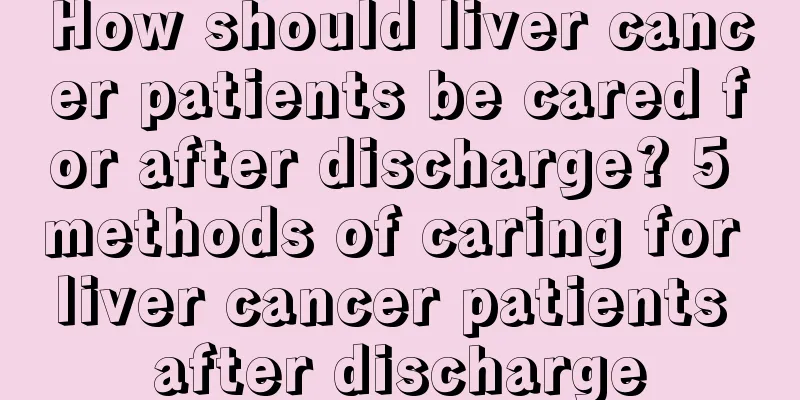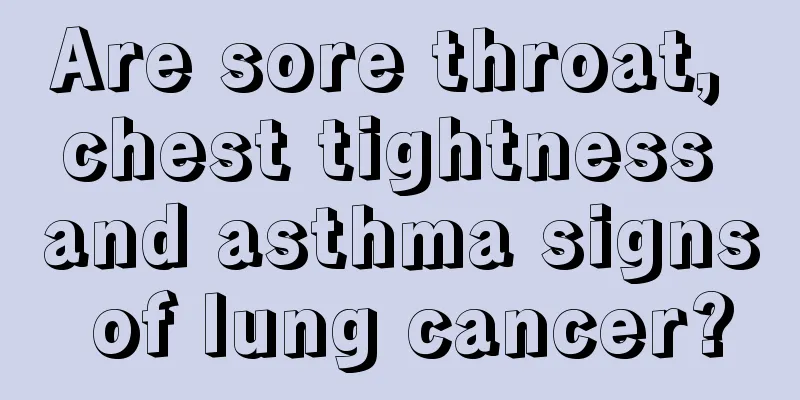How should liver cancer patients be cared for after discharge? 5 methods of caring for liver cancer patients after discharge

|
Nursing methods for common symptoms of liver cancer patients after discharge Liver cancer patients can be discharged from the hospital after a period of hospitalization and observation when their condition stabilizes. However, discharge does not mean everything is fine. During the period of recuperation at home, patients may still experience symptoms such as fever and constipation. They need to understand some home-related care methods to help relieve their pain. There are many reasons for liver cancer patients to have fever, mainly cancer fever, infection and drug-induced fever. The treatment methods are as follows: 1. Cancer fever is sensitive to common antipyretics, and symptomatic treatment with antipyretics is sufficient. However, since most antipyretics can cause gastrointestinal irritation, patients with poor gastrointestinal function can use other routes of administration, such as rectal indomethacin suppositories. 2. Physical cooling is also a feasible measure. If the fever is too high, you can use ice packs and warm water baths. Pay attention to choosing the appropriate method according to the patient's tolerance. If all methods cannot reduce the fever, you should contact a doctor. Patients are bedridden for a long time during hospitalization and after discharge, and constipation is caused by emotional factors and dietary factors such as too little crude fiber in the diet and too little water intake. Constipation can cause upper gastrointestinal bleeding, rupture of liver cancer nodules, etc. The treatment methods are as follows: 1. Let the patient develop the habit of going to the toilet regularly, or relieve themselves in bed. 2. For those suffering from constipation, you can use anal suppositories or enema suppositories, but do not force your bowels. 3. Drink more water to promote metabolism. You can also eat bananas appropriately, which have a certain intestinal moisturizing effect. 4. You can add appropriate amounts of crude fiber foods to your diet, but people with varicose veins in the upper gastrointestinal tract should be cautious. 5. If your physical condition allows, try to get out of bed and move around appropriately. This can prevent or relieve constipation and is also beneficial to your physical recovery. Hepatic arterial chemoembolization can prevent recurrence of hepatocellular carcinoma after resection Clinical statistics show that more than half of patients with liver cancer will have cumulative recurrence within 5 years after radical resection. Therefore, preventing recurrence is very important for patients undergoing liver cancer resection. At present, the clinically effective adjuvant treatment method that can effectively reduce the risk of postoperative recurrence in patients with liver cancer is hepatic artery embolization chemotherapy, but whether to perform hepatic artery embolization chemotherapy depends on the specific situation of the patient. Since hepatic artery chemoembolization itself can cause certain damage to liver function, there is still controversy at home and abroad as to whether auxiliary hepatic artery chemoembolization should be performed after radical surgery for liver cancer. Clinical consensus is that for patients with liver cancer who have a higher risk of postoperative recurrence, 1 to 2 hepatic artery chemoembolizations should be performed. If the patient has a small liver cancer, no vascular invasion, and a single nodule, auxiliary hepatic artery chemoembolization may not be performed after surgery. Especially for patients with small liver cancer who have severe cirrhosis, hepatic artery chemoembolization should be used with caution after surgery. However, systemic chemotherapy after liver cancer surgery is not recommended at present, because liver cancer is not sensitive to traditional chemotherapy drugs, and there is no evidence to show that systemic chemotherapy is effective in preventing postoperative recurrence. In addition, clinical trial results have confirmed that the use of interferon for 1 to 2 years after radical surgery can reduce the postoperative recurrence rate. Moreover, the adverse reactions of interferon are relatively small and most patients can tolerate it, which can also be a way to prevent postoperative recurrence in patients with liver cancer. |
Recommend
Can knee popping heal itself?
We often find some phenomena during exercise, suc...
The extragastric manifestations of early symptoms of gastric cancer are specifically introduced as follows
The early symptoms of gastric cancer can be divid...
What is the reason for a hard lump under the earlobe?
If a hard lump grows under the earlobe, you shoul...
What can I use to wash out stained underwear
When washing women's underwear, if it is mixe...
I dream a lot when I sleep and feel tired when I wake up
Why do I have many dreams and wake up feeling tir...
Brief introduction to nursing care for gallbladder cancer
Among the malignant tumors of the gallbladder, ga...
Male friends should be careful about the dangers of testicular cancer
Testicular cancer is a malignant tumor disease th...
How much does it cost to diagnose small cell lung cancer
How much does it cost to diagnose small cell lung...
Can patients with nasopharyngeal cancer go to work? How long can patients with nasopharyngeal cancer live?
Can patients with nasopharyngeal cancer work? How...
What is the pain on the surface of the belly
Sometimes people will feel pain on the surface of...
Can a man with gallbladder cancer have children?
According to statistics, more than half of young ...
Other teeth ache after tooth extraction
It doesn't hurt when you have a tooth pulled ...
What is the treatment for cerebral artery embolism?
As we all know, cerebral artery embolism is very ...
What to do if the face is asymmetrical_How to correct asymmetrical face
Our country pays attention to the beauty of symme...
What to do if your stomach is too full
Normally, some people cannot control themselves w...









